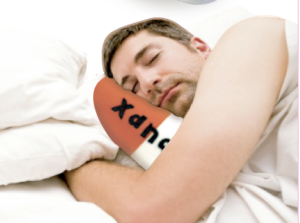 Hypnotic drugs (aka sleeping pills such as Ambien-zolpidem, Sonata-zaleplon) and most sedative/tranquilizer drugs (Ativan-lorazepan, Klonopin-clonazepam, Xanax-alprazolam, etc.) are potent pharmaceuticals with moderate benefits and significant risks. I frequently am asked to prescribe them. We need to review with each of you why we use them and ask ourselves if this is really the best we can do for the problem. Why?
Hypnotic drugs (aka sleeping pills such as Ambien-zolpidem, Sonata-zaleplon) and most sedative/tranquilizer drugs (Ativan-lorazepan, Klonopin-clonazepam, Xanax-alprazolam, etc.) are potent pharmaceuticals with moderate benefits and significant risks. I frequently am asked to prescribe them. We need to review with each of you why we use them and ask ourselves if this is really the best we can do for the problem. Why?
Risks of Hypnotics and Sedatives
We have accumulated lots of information in the past decade or so about the downside of hypnotics. The key concern is that all sleeping medications can not only produce morning and daytime hangover, but some degree of cognitive impairment that may be additive over time. In older patients, use of sleeping pills and tranquilizers is associated with increased injury from falls and related accidents, as well as greater tendency to long-term cognitive impairment. The risk is highest with regular use, less so with intermittent use. Everyone of Medicare age or greater is especially at risk. That is substantial reason to be careful.
Why Is Sleep So Hard?
Sleep difficulty is not universal. A few years ago I learned from Dr. Charles Czeisler, the Harvard Medical School inventor of sleep medicine, that rural populations in Indonesia, off the electricity grid, essentially never had sleep issues. As he related about a family who lived in a small room with their animals, when asked about difficulty with sleep, they said they had none. “Sun goes down, we go to sleep. Sun comes up, we get up.” In our lives, sleep is not so simple.
Sleep Hygiene Is Important
Good sleep hygiene matters. It is not a difficult concept, no more so than good “course management” in golf. Do the obvious. Don’t watch TV in your bedroom. Stop looking at TV or other electronic screen (iPads etc) a half hour or more before going to bed. Keep your bedroom dark. No night lights. Don’t do activating activities just before bed. Have a regular bedtime and awakening (like sundown and sunup). And so forth. Not much harder than, “Don’t go for the green over water if your shot has to be perfect to get there.” Read something calming in bed or do a crossword puzzle. The bedroom is for sleep and lovemaking only. Except for playing with the grand-kids in the morning.
What Happens When Sleep Hygiene Fails?
Unfortunately, good sleep hygiene, while effective for more people than you might think, doesn’t work for everyone. In those cases I have prescribed hypnotics for occasional use. One difficulty, though, is that occasional pretty soon becomes continuous. And OTC alternatives, such as Benadryl (diphenhydramine), carry the same cognitive risks as prescription sleeping pills. So do all the first generation antihistamines that are used for OTC sleep aids. And so do many older antidepressants (amitriptyline, nortriptyline and related), as well as trazadone. These were all shown to be cognitive risks when used regularly in a study in the Kaiser Permanente system on the West Coast about 4 years ago.
What to Do?
I am not really sure what the next move is for everyone with a sleep disorder who has been using regular sleeping pills. Dr. Sobel and I have discussed this issue regularly. All the choices are hard. I do intend to review sleeping pill use with everyone at your regular checkup, to review sleep hygiene efforts, and to try to dial down use of hypnotics and sedatives whether for regular or intermittent use. I do recognize that many people have used hypnotics for decades and sleep well with the drugs and don’t without and have not had any clear adverse effects.
So we will move cautiously. I expect to seek more consultation from sleep medicine specialists to see what they have to offer. The major point is that there are significant cognitive and accident risks from long-term hypnotics and we should try hard to derive a better solution.

